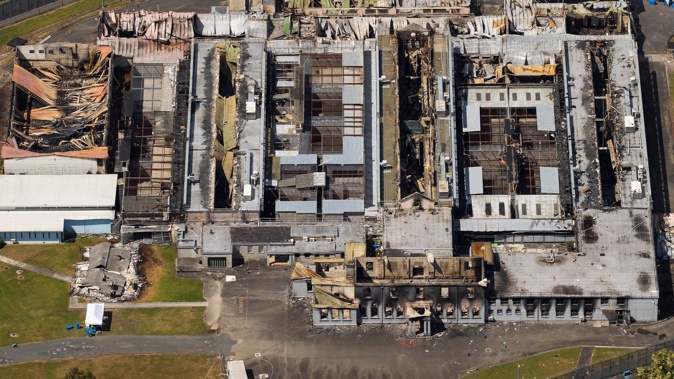

Prisoners subjected to unreasonable lock-up hours, a lack of privacy in the toilet and shower, and decrepit conditions have prompted an urgent call to fix systemic cultural and leadership issues within the Department of Corrections.
And the Ombudsman wants a legislative review to make sure there is a greater emphasis on this country’s human rights obligations in prisons.
While Corrections accepted the recommendations and said change had already begun, it was dealing with a complex and vulnerable population and safely managing this risk was its priority.
Chief Ombudsman Peter Boshier said the problems in New Zealand prisons had been ongoing for years despite repeated recommendations by him and other agencies for change.
Today he released a damning report calling on Ara Poutama Aotearoa | the Department of Corrections to urgently fix a series of workplace culture and leadership issues preventing it from achieving lasting change.
The report, Kia Whaitake | Making a Difference, followed his investigation into how Corrections had responded to repeated calls for improvements in the way prisoners were treated.
“Most prisoners will go back into society. It’s important they are treated with dignity and respect to minimise their chances of reoffending,” Boshier said.
/cloudfront-ap-southeast-2.images.arcpublishing.com/nzme/RXLIE6BF4S6K3C7CMB4RRSPAQQ.jpg)
Chief Ombudsman Peter Boshier.
The catalyst for his self-initiated investigation was the 2020 Christmas and New Year riots at Waikeria Prison.
“Waikeria was one of many prisons I had inspected over a number of years where despite countless recommendations for change by both me and other oversight agencies, the same issues kept coming up, again and again,” Boshier said in a statement.
“Those issues included unreasonable lock-up hours, a lack of privacy in toilet and shower areas, and in the case of Waikeria, decrepit conditions in its high-security areas.”
Although Corrections accepted most of the recommendations, the riots still occurred.
“This troubled me so much that I felt a deep dive was necessary to understand why the Department hasn’t been able to make meaningful and long-lasting change.”
The investigation identified a range of systemic issues and a senior leadership team failing to address a risk-averse and reactive culture, Boshier said.
“I was concerned to find that people I interviewed during the course of my investigation consistently described a divided organisation and a pattern of disconnection at all levels, mainly between frontline prison staff and head office.
“In my view, all of the issues I’ve outlined are shortcomings that Corrections’ senior leadership could have addressed but has not.
“I accept that the Department is attempting to overhaul its approach but progress has been too slow and the fair treatment and rights of prisoners have, unfortunately, been the collateral damage.”
Boshier said he saw limited evidence that Correction’s senior leadership had paid serious attention to the feedback from staff surveys.
“I found that the Department’s senior leaders should have known about many of the culture and leadership issues identified in this investigation,” he said.
Feedback that Corrections lacked openness and accountability concerned Boshier who said the Department reportedly often operated in secret and he believed more transparency was needed.
“I was also surprised to find during my investigation, that prisoners’ rights were not at the heart of decisions made at every level of the organisation.”
Boshier said the Department had legal obligations to treat prisoners fairly, safely, and humanely, and to make sure their living conditions met an acceptable standard, but that its approach to governing legislation was too narrow.
“That is why I am recommending that the Corrections Act 2004 and the Corrections Regulations 2005 are reviewed to make sure Te Tiriti o Waitangi, the New Zealand Bill of Rights Act, and relevant international human rights obligations such as the Mandela Rules, are given greater emphasis.”
Other areas of concern included a lack of cultural competency and capability across the Department to work in partnership with Māori, and the tendency to explain away the concerns and recommendations of oversight bodies.
There also needed to be better governance, accountability, and reporting along with comprehensive strategies to improve workplace culture and planning, Boshier said.
/cloudfront-ap-southeast-2.images.arcpublishing.com/nzme/6EWLPVNVOQKBNOWACRFUGMZPK4.jpg)
Department of Corrections chief executive Jeremy Lightfoot said the Department was tasked with looking after 8500 prisoners. Photo / Mark Coote
Corrections chief executive Jeremy Lightfoot accepted the recommendations and said Boshier’s findings were consistent with what the Department had already identified, and the recommendations aligned with work already under way through its organisational strategy Hōkai Rangi.
Lightfoot agreed with Boshier that treating prisoners fairly and humanely, and supporting their rehabilitation, was an important element of public safety in the long term.
However he said it was important to note that immediate safety was also critical.
“We manage people who have been deeply impacted by New Zealand’s systemic problems with mental health, gangs, poverty, addiction, violence and crime, often throughout their entire lives.
“Over 80 per cent of the prison population have had convictions for violence in their offending histories, more than 90 per cent have had a lifetime diagnosis of a mental health or substance abuse disorder, and 35 per cent have a gang affiliation which is a known predictor of violence.”
He said frontline staff were highly dedicated and skilled in helping people to make positive change, but transformative change was not immediate.
“The reality is, despite our best efforts, some people in prison go to extreme lengths to harm others, and safely managing this risk must be an absolute priority for us.
“This is never a justification for falling short when it comes to managing people fairly – safety and the humane treatment of prisoners are mutually reinforcing, not mutually exclusive.
“Our work is immensely challenging, and any failures can be life-threatening, which is why immediate safety needs to be such a key focus within our organisation.
“As we move forward with implementing the recommendations made by the Chief Ombudsman, we will centre our work around all forms of safety and wellbeing – of our staff, prisoners and the public.”
Natalie Akoorie is the Open Justice deputy editor, based in Waikato and covering crime and justice nationally. Natalie first joined the Herald in 2011 and has been a journalist in New Zealand and overseas for 27 years, recently covering health, social issues, local government, and the regions.

Take your Radio, Podcasts and Music with you









